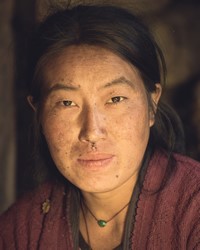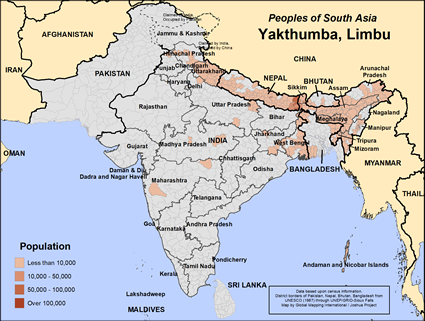Yakthumba, Limbu in India

Photo Source:
manothegreek
|

Map Source:
People Group data: Omid. Map geography: UNESCO / GMI. Map Design: Joshua Project.
|
| People Name: | Yakthumba, Limbu |
| Country: | India |
| 10/40 Window: | Yes |
| Population: | 144,000 |
| World Population: | 548,800 |
| Primary Language: | Nepali |
| Primary Religion: | Hinduism |
| Christian Adherents: | 9.77 % |
| Evangelicals: | 0.00 % |
| Scripture: | Complete Bible |
| Ministry Resources: | Yes |
| Jesus Film: | Yes |
| Audio Recordings: | Yes |
| People Cluster: | South Asia - other |
| Affinity Bloc: | South Asian Peoples |
| Progress Level: |
|
Introduction / History
The Yakthumbas are commonly called the Limbu people. The Limbu are a sub-group of the Kirant people. They speak a dialect of Kirant which is a Tibeto Burman language.
The origin of the Limbu is uncertain, but they are clearly of Mongolian descent. In the later part of the 1700s, Nepal was formed by uniting various ethnic groups and principalities under a high-caste Hindu dynasty. This conquest resulted in ethnic and cultural splits with the Limbu.
There are 13 Limbu sub-groups. Legend says that five of the groups came from Varanasi, India and the other eight from Lhasa, Tibet. There is no social discrimination among the Limbu sub-groups, although there are several different clans and sects.
The Limbu live mainly in eastern Nepal between the Arun River and the border of the Sikkim state in India. They have a significant population in India, and a small one in Bhutan. In India they speak Nepali.
What Are Their Lives Like?
Agriculture is the main source of income for the Limbu. Rice and maize are their principal crops. Agricultural productivity is greatly limited by insufficient technology. Excess crops are often traded for food that cannot be grown in the region or for necessary items.
The men generally plow the fields and the women plant the seeds. However, at harvest time, both men and women work together to bring in the crops. Extended families often unite to help each other during harvest time.
In the past, marriages were arranged by families. Neither the bride nor the groom had much say about the marriage payments or ceremonies. Modern times have changed this; today, both parties have an opportunity to make decisions about the wedding. There are three types of legal marriages: adultery, arrangement and abduction. In the case of adultery, the previous husband must be paid compensation.
Women are influential within Limbu families, especially if the husbands are in the military and stay away for long periods. However, a woman is not fully recognized until she bears her first child.
Drinking and dancing are very important to the Limbu. Weddings, mourning, gift exchanges and settlements of conflicts all involve much consumption of liquor. When visitors come to a Limbu village they celebrate with dancing. These affairs give the young people a chance to meet and enjoy dancing and drinking.
The Limbu society is patrilineal, which means that the line of descent is traced through the males. Related families make up clans. When a clan member dies, the entire group is considered polluted. They then must all go through a period of re-purification.
What Are Their Beliefs?
The Limbu are predominantly Hindu, though they are usually Buddhist in Bhutan they adhere to their own religion in Nepal. In India, there are more Christ followers among them than the other three countries.
Hinduism is the ancient religion of India. It's a catch-all phrase for the local religions of South Asia, so it is very diverse. At the popular level, Hindus worship and serve the gods of the Hindu pantheon. They visit Hindu temples and offer prayers, food, flowers, and incense to their gods in hopes of gaining protection and benefits. They do not have a personal or familial relationship with their gods like Christians or Jews. There are other Hindus who are much more philosophical, especially among the Brahmins.
Almost all Hindus participate in yearly celebrations like Holi, the festival of colors and the start of spring / Diwali, the festival of lights / Navratri, the celebration of autumn / and Rama Navami, Rama's birthday.
What Are Their Needs?
The Limbu people need the hope and joy of knowing their Creator and following the Savior, who alone can forgive sins and direct their lives.
Prayer Points
Pray for a "Book of Acts" type of movement to Christ among the Limbu people in India.
Pray for the Limbu people to understand and embrace that Jesus wants to bless their families and neighborhoods.
Pray for the Holy Spirit to anoint believers from the Limbu people to change their society from within.
Pray for a movement in which the Holy Spirit leads and empowers disciples to make more disciples.
Pray for a movement of Jesus to heal and strengthen Limbu communities.